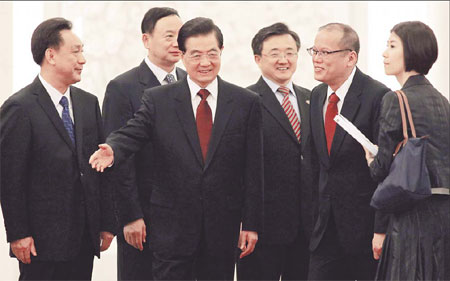Sino-Philippine trade to double
Updated: 2011-09-01 10:15
By Cheng Guangjin and Lan Lan (China Daily)
|
|||||||||||
|
|
|
President Hu Jintao introduces members of the Chinese team to visiting Philippine President Benigno Aquino during a welcoming ceremony at the Great Hall of the People in Beijing on Wednesday. [Photo / China Daily] |
$60 b target set for 2016 as top leaders put sea dispute aside
BEIJING - China and the Philippines aim to double bilateral trade to $60 billion in 2016, indicating that economic cooperation is a priority as the countries put aside the South China Sea dispute that has strained ties.
Securing a number of deals with China on Wednesday, Philippine President Benigno Aquino continued with his five-day state visit and reiterated that there is much more to Sino-Philippine relations than maritime disputes.
Officials, with their presidents in attendance following talks that lasted for about an hour, signed nine documents including a memorandum of understanding to strengthen cooperation between the two foreign ministries and a five-year trade and economic development program.
Aquino's first visit to China, from Aug 30 to Sept 3, comes just over a year since he assumed the presidency and takes place after a recent dispute in the South China Sea.
Aquino said earlier in August that his nation's military would play a more prominent role in the South China Sea as the Philippine navy's newest warship sailed into Manila Bay from the United States.
China insists it has indisputable sovereignty over the islands in the South China Sea and surrounding waters, while the Philippines, Brunei, Malaysia and Vietnam all have competing claims to some islands and reefs in the resource-rich area.
China has been consistent and clear in its stance on the issue and insists that the disputes be resolved peacefully through negotiations, Hu told Aquino, according to the Foreign Ministry.
Hu suggested that all sides concerned put aside disputes before the issue is resolved and jointly explore the South China Sea, which he said is in the common interests of all relevant parties.
Hu said China is willing to implement the Declaration on the Conduct of Parties in the South China Sea (DOC) with all parties, including the Philippines, to turn the sea into an area of peace, friendship and cooperation.
Aquino said that the Philippines is committed to maintaining peace and stability in the region and implementing the DOC.
The South China Sea issue does not constitute the entirety of Sino-Philippine relations, and should not affect the development of ties and cooperation, Aquino said.
He also said that he hopes the issue could be resolved as soon as possible for the benefit of the people of the two countries.
The documents signed included an assistance grant from China and sending investment experts to the Philippines. Deals concerning cooperation in culture, sports, tourism and the media were also signed.
China was the first country to extend an invitation to Aquino, on his inauguration day, June 30, 2010.
Aside from the South China Sea dispute, diplomatic relations were also buffeted over the past year by the botched rescue of Hong Kong bus hostages in Manila.
"I apologize for taking too long, about a year, before I managed to get here," Aquino said. "But it is a worthwhile trip so far and I think it is a good opportunity to broaden and deepen the ties that have existed between our people for centuries."
The two countries hope to boost bilateral trade to $60 billion in 2016, Vice-Premier Wang Qishan said at the China-Philippines Economic and Trade Forum on Wednesday morning.
Aquino led a delegation of nearly 300 business leaders to China during his visit. Two more business forums will be held in Shanghai and Xiamen.
Bilateral trade hit $27.7 billion in 2010, up 35 percent year-on-year, according to the Ministry of Commerce. China is the third-largest trading partner of the Philippines after the US and Japan.
Wang encouraged Chinese companies to expand investment and take part in construction projects in the Philippines.
China is the Philippines' seventh-largest foreign investor.
"More investment means jobs," Aquino said at the forum, adding that the country is open for business and the government is determined to soothe the path for investors.
In 2010, the Philippines' gross domestic product grew 7.3 percent year-on-year, the highest in the past 35 years, said Xu Ningning, deputy secretary-general of the China-ASEAN Business Council.
The rapid growth is attractive for Chinese investors, and bilateral trade and investment will continue to benefit from the Free Trade Area between the ASEAN and China, said Xu.
Yang Baoyun, deputy director of Peking University's Center for Southeast Asian Studies, told China Daily that Aquino's visit reflects the goodwill that both countries have.
China's offer to boost bilateral trade helps pave the way for solving territorial disputes, Yang said. "It is a pragmatic way to create conditions to solve disputes."
The visit will also take Aquino to his ancestors' hometown, Hongjian, Fujian province. His mother, the late Philippine president Corazon Aquino, visited the area 23 years ago.
Zhang Yunbi contributed to this story.














